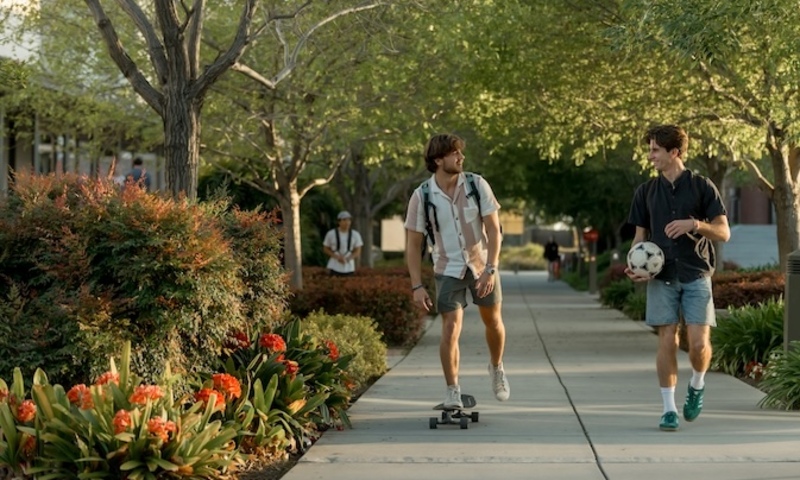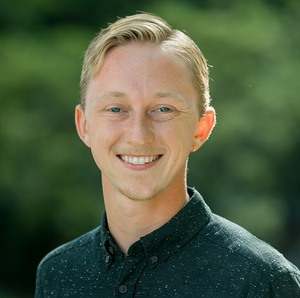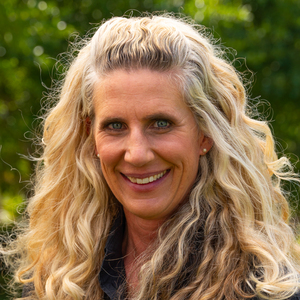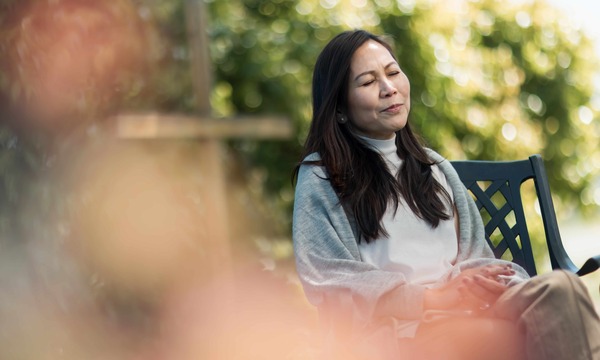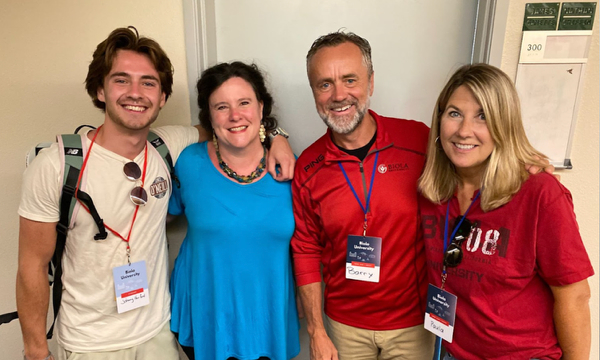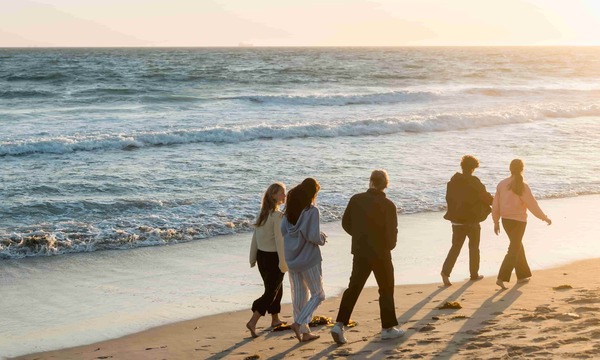Biola's goal is to take your student’s health and safety as seriously as you do. At our Ask Me Anything Webinar on July 10, leaders from our Campus Safety department and the Biola Health Center answered your questions and your student’s well being on Biola’s campus. Get to know our leaders and find the answers to these questions below.
Get to know the leaders…
Chief of Campus Safety, John Ojeisekhoba has been on campus at Biola for almost 30 years, first as a student, then serving as Chief of Campus Safety for the past 25 years. “Chief O,” as he’s affectionately called by students, also serves as an adjunct faculty member teaching self defense class for women, and he recently retired from his 20 year service as a police officer for the city of Garden Grove. In 2023, Chief O was appointed to the U.S. Department of Homeland Security’s Academic Partnership Council, and he continues to serve in leadership with the International Association of Campus Law Enforcement Administrators.
“Biola is a very unique and exceptional place. I have had opportunities to work for other universities, but my faith in Christ matters more to me. This is a place where I can grow in my faith in Christ, mingle with students, etc.” - Chief O
Interim Director of the Student Health Center, Sofia Kim began her time at Biola in 2018 as a graduate student in our Talbot School of Theology and began working at the Student Health Center around the same time. She is a family nurse practitioner and psychiatric nurse practitioner who leads our Health Center team and cares deeply about the holistic health of Biola students.
“We want to care for students in body, mind and soul in the totality of who they are. We ask students, ‘How are you doing spiritually? How else can we care for you?’” - Sofia Kim
Campus Safety
Biola Campus Safety takes crime prevention and emergency response extremely seriously and takes pride in the fact that Biola is ranked among the safest college campuses in the country. Crime rates on campus remain very low. Full details can be found on the Annual Security Report.
“It’s not good enough that we keep our campus safe. We want to make our students FEEL safe. Those are two different things, and we care about both deeply.” - Chief O
Emergency response — what does emergency response look like? When will parents be notified in case of an emergency?
Biola has an emergency management team which includes:
The emergency response team: manage emergencies on the front line
The emergency building coordinators: located in each building on campus and are responsible for getting students and staff to predesignated safe meeting points during things like earthquakes or lockdowns. Can communicate with Campus Safety via handheld radios
President's cabinet: make decisions in response to emergencies when needed about closing campus, pausing classes, distributing of funds, etc.
Travel response team: respond to emergencies faced by students traveling overseas
Each of these teams receives regular training from Campus Safety, and thorough Emergency Response Guidebooks are located in each building on campus.
Biola has emergency containers on campus stocked with things like heavy power tools, generators, lighting equipment, medical supplies, and seven days worth of ready to eat food and water.
The local sheriff’s department is located directly across the street from Biola and maintains a close relationship with Biola Campus Safety.
Biola Campus Safety officers are armed with firearms as a precautionary measure for the protection of students.
Biola has an emergency notification system that reaches students through text and email as well as an outdoor public address system that can be used to communicate messages to students as well.
If an emergency situation occurs, Campus Safety's primary focus is notifying and updating anyone on campus. Parents are typically notified within 30 minutes of an emergency once Campus Safety has already taken steps to support and care for students. When Campus Safety communicates with parents they provide parents with information on what has taken place, what actions are currently being done and what actions will take place moving forward.
Walking across campus — are there resources that make sure students feel safe when walking across campus?
Campus Safety works with Biola Facilities to ensure that campus is well lit for walking at night.
Biola’s campus is very safe, but if a student does not feel safe for any reason they can always call for a Campus Safety escort. Campus Safety officers will happily give students a ride from one end of campus to another.
Rave Guardian is a phone app that Biola encourages students to download. This app allows students to set up a buddy system so that others can know when they arrive at their locations.
Campus Safety is active 24/7 and always available for students through the call center.
Bikes and cars — what safety measures are in place for bicycles and cars?
Bicycles are a regular target for theft on many college campuses. To combat this, Campus Safety has purchased U-locks in bulk. Any student with a registered Biola bicycle can take a U-lock for free to protect their bicycle.
Biola’s campus is 100% gated and is constantly monitored by many security cameras. Vehicles are very safe on campus. Biola’s auto theft rate remains very low. Details can be found on the Annual Security Report.
Blue lights — how do you use blue light stations if there is an emergency?
Blue light stations are located close to buildings and in parking lots. Students can simply push a button on these stations to call Campus Safety’s communication center (equivalent to a 911 call center). Most of the locations with blue light stations can be seen by Campus Safety’s cameras. When a blue light button is pressed, Campus Safety dispatches an officer to this location and continues to monitor the area through cameras.
After a student uses a blue light station, Campus Safety recommends they walk towards a well lit area with other people and use a cell phone to call the Campus Safety direct line.
Students can also use the Rave Guardian app to contact Campus Safety.
Bike permits — do students need permits to have bicycles on campus?
Yes. Campus Safety asks students to provide their bicycle’s serial number which is then tied to a bicycle permit sticker that is displayed on all campus bicycles. This bicycle permit is free. Campus Safety requires bicycle permits so that bicycle owners are easier to identify in the case that a bicycle is stolen or misplaced.
Bicycles on campus must be locked to a bike rack with a U Lock. U Locks can be picked up for free from the Campus Safety office. Chain locks are not permitted.
Health Center
The Biola Health Center is focused on holistic care for Biola Students. The Health Center partners with the Biola Counseling Center, Spiritual Direction, Pastoral Care, Academic Advising, and the Career Center to help students stay healthy in body, mind and soul.
Services — what does the Health Center provide?
The Student Health Center provides urgent care and primary care services to all Biola students. It also functions as a travel consult when students travel off campus.
The Health Center is staffed with an urgent care doctor, and a part time psychiatrist. Health Center nurses perform services like managing medications, blood draws, testing, travel consultations and more.
A primary feature of the Health Center is the Care Wall — a large wall stocked with over thirty unique supplies that students can access for free including band aids, ibuprofen, sunscreen and more.
Some medication is available to students at cost within the Health Center so that students do not have to get themselves to a pharmacy.
Outside health care — what would be considered within the Health Center’s purview? When should a student transition to being seen outside of the Health Center?
When students arrive at the Health Center, nurses assess their situation on a case by case basis. Many cases can be treated by the Health Center, but when nurses notice that a case is getting worse or would be better treated by a specialist as opposed to the Health Center’s family care doctor they will refer students to an urgent care, hospital or specialist. All of this depends on the specialty required for each case and level of emergency.
Students are encourage to familiarize themselves with the emergency rooms and urgent care facilities on the Health Center’s Emergency and After Hours Services webpage.
Common cases — what are the most common cases the Health Center sees and what type of treatment will they provide?
The Biola Health Center is well equipped to treat common illnesses and injuries. The most common cases the Health Center sees are upper respiratory infections like coughs and colds. Injuries like twisted ankles and concussions are all fairly common as well because of sports and activities on campus, and many students use the Health Center to help treat skin conditions like rashes and acne.
The Health Center also works with students who have psychiatric and mental health needs. Much of this work happens in collaboration with the Biola Counseling Center which provides outpatient mental health services to Biola students at reduced rates.
Therapists from the BCC offer brief, problem-solving conversations 4 days a week at the Health Center, where they listen, provide support and help brainstorm solutions. Drop-In Consultation is free for all Biola University students.
Counseling center — when do you advise a student to come to the Health Center vs. the Biola Counseling Center?
Students who require medications for psychiatric and mental health needs can receive these through the Health Center.
Students who are in need of therapy can receive this through the Biola Counseling Center.
The Biola Counseling Center offers faith-integrated, culturally-informed individual therapy, group therapy, couples therapy, and limited psychological testing all within walking distance of campus. Undergraduate and graduate students have access to weekly sessions to support their mental health and well-being at the discounted rate of just $20 per session. Therapy can help students cope with stress and the general challenges of college life as well as address family/friend/romantic relationship issues, spiritual concerns, and more. Services are provided by clinical psychology and MFT graduate students under licensed supervision. Students whose conditions require higher levels of care and support may be referred to a licensed provider off campus through their health insurance.
Insurance — will my insurance work with the Health Center?
All on-campus students are required to have health insurance. Biola provides health insurance to any student who does not have their own. All students will see a charge for health insurance on their account. If your student is already covered by health insurance that meets Biola’s health insurance requirements, it’s important that you go to the Gallagher portal to have this fee waived.
Using the Health Center is FREE for all enrolled students. Students are not billed for being seen at the health center. However, there are costs for things like purchasing medications, tests and lab work, blood work and other services. These costs come into play only for certain services, but being seen by a doctor or nurse is free at the Health Center
The Health Center provides a super bill for special services to allow students to see if their insurance will cover or reimburse them.
The Health Center does not provide services for Medi-Cal. The Health Center will still see students who are covered by Medi-Cal but may suggest that they see their primary care doctor for certain services to ensure these services are covered through insurance.
Kaiser is also a stricter insurance that does not always reimburse students who have services done at the Biola Health Center.
The Health Center can send student’s prescriptions straight to a pharmacy if the student desires to purchase their medication through a pharmacy instead.
Vaccines — are COVID or other vaccines provided?
The Health Center no longer provides COVID-19 vaccinations, but there are plenty of pharmacies in the Biola area that will provide them.
The Health Center does provide flu vaccines during flu season.
Hepatitis B, tetanus, meningitis and MMR vaccines as well as TB skin tests are all available at the Health Center.
Prescriptions — what is the procedure for monthly prescriptions and long term medication?
Students who have chronic illnesses or long term needs should make an appointment with one of the Health Center's doctors within their first week on campus to assess the needs of their situation
Medications — can I supply pill trays to my student for meds and vitamins? Are there restrictions?
Students are totally fine to take their own medications without involvement from the Health Center.
 Biola University
Biola University